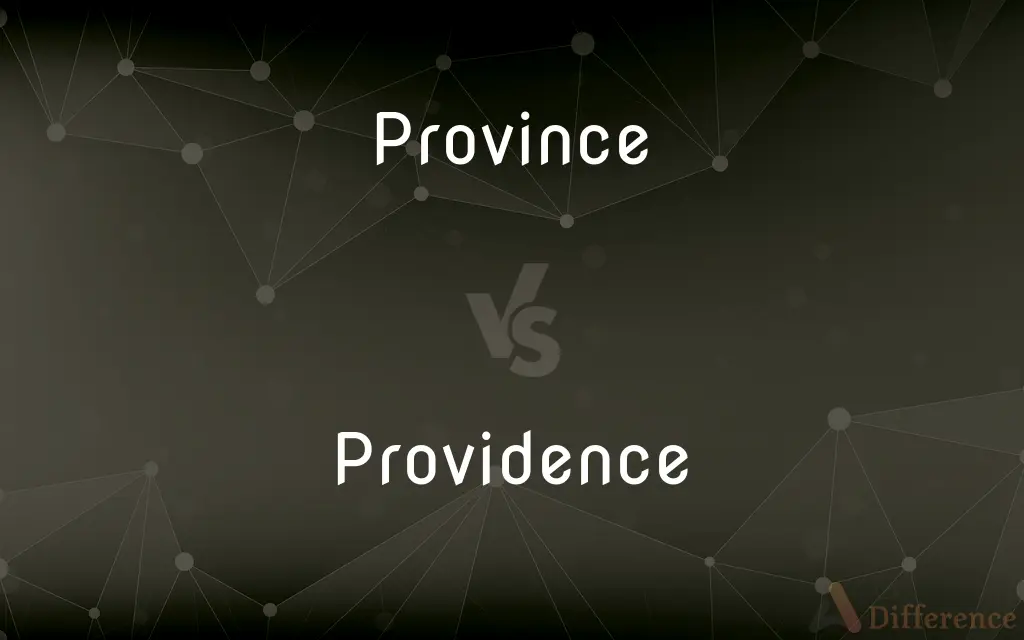Province vs. Providence — What's the Difference?
By Tayyaba Rehman & Fiza Rafique — Updated on April 3, 2024
A province is a territorial unit within a country or empire, while Providence refers to divine guidance or care, or the capital city of Rhode Island.

Difference Between Province and Providence
Table of Contents
ADVERTISEMENT
Key Differences
A province typically denotes a secondary or administrative division within a country, such as those found in Canada or China, serving as a layer of governance beneath the national level. These regions have specific administrative roles and responsibilities, including governance, law enforcement, and sometimes taxation. On the other hand, Providence, when not referring to the city, embodies the concept of divine guidance or guardianship by a supreme deity, a belief prevalent in various religions that suggests a protective care or direction bestowed upon the universe or individual people.
When referring to the capital city of Rhode Island, Providence is known for its rich history, educational institutions, and as a cultural hub in the United States. It contrasts with the broader concept of a province, which may encompass multiple cities, towns, and rural areas, each contributing to the province's unique identity, economy, and cultural heritage.
Provinces often play significant roles in a country's political, economic, and administrative frameworks, providing a link between the local and national governments. In contrast, the theological concept of Providence represents a spiritual belief system that influences individuals' and communities' faith and practices, independent of geographic or political boundaries.
In the context of governance, provinces can vary widely in size, population, and level of autonomy, depending on the country's constitution and administrative organization. Meanwhile, Providence (the city) showcases specific characteristics such as its architecture, academic environment, and maritime economy, distinguishing it from the administrative concept of a province.
Comparison Chart
Definition
A territorial division within a country, for administrative purposes.
Divine care or guidance, or the capital city of Rhode Island.
ADVERTISEMENT
Context
Administrative
Religious or Geographic
Role in Governance
Participates in national and local governance structures.
As a city, serves as a local government entity.
Geographic Scope
Can encompass multiple cities and towns within a country.
Refers specifically to a single city or a divine concept.
Cultural and Economic Influence
Varies widely, contributing to the country's diversity.
As a city, has a specific cultural and economic impact.
Compare with Definitions
Province
Administrative Division.
The province of British Columbia in Canada is known for its natural beauty and diverse climate.
Providence
City’s Economy.
Providence's economy benefits greatly from its universities and healthcare institutions.
Province
Cultural Region.
The province is celebrated for its unique festivals and culinary traditions.
Providence
Capital City.
Providence, Rhode Island, is renowned for its historic architecture and vibrant arts scene.
Province
Political Entity.
The provincial government is responsible for education and healthcare services.
Providence
Philosophical Concept.
Discussions on providence delve into the nature of free will versus destiny.
Province
Sub-national Jurisdiction.
Each province in China has its own local government and specific policies.
Providence
Divine Guidance.
Many believe in providence as a form of divine intervention in human affairs.
Province
Geographic Area.
The province encompasses several major cities, including the provincial capital.
Providence
Care or Guardianship.
The farmer spoke of the providence that brought timely rain to his crops.
Province
A province is almost always an administrative division within a country or state. The term derives from the ancient Roman provincia, which was the major territorial and administrative unit of the Roman Empire's territorial possessions outside Italy.
Providence
Care or preparation in advance; foresight.
Province
A principal administrative division of a country or empire
Chengdu, capital of Sichuan province
Providence
Prudent management; economy.
Province
The whole of a country outside the capital, especially when regarded as lacking in sophistication or culture
I made my way home to the dreary provinces by train
Providence
The care, guardianship, and control exercised by a deity; divine direction
"Some sought the key to history in the working of divine providence" (William Ebenstein).
Province
An area of special knowledge, interest, or responsibility
She knew little about wine—that had been her father's province
Providence
Providence God.
Province
A territory governed as an administrative or political unit of a country or empire.
Providence
Preparation for the future; good governance, foresight.
Province
(Ecclesiastical) A division of territory under the jurisdiction of a metropolitan.
Providence
The careful governance and guidance of God (or another deity, nature etc.).
Province
Provinces Areas of a country situated away from the capital or population center.
Providence
A manifestation of divine care or direction; an instance of divine intervention.
Province
An area of knowledge, activity, or interest
A topic falling within the province of ancient history.
Providence
Specifically, the prudent care and management of resources; thriftiness, frugality.
His providence in saving for his old age is exemplary.
Province
The range of one's proper duties and functions; scope.
Providence
The act of providing or preparing for future use or application; a making ready; preparation.
Providence for war is the best prevention of it.
Province
(Ecology) An area of land, less extensive than a region, having a characteristic plant and animal population.
Providence
Foresight; care; especially, the foresight and care which God manifests for his creatures; hence, God himself, regarded as exercising a constant wise prescience.
The world was all before them, where to chooseTheir place of rest, and Providence their guide.
Province
Any of various lands outside Italy conquered by the Romans and administered by them as self-contained units.
Providence
A manifestation of the care and superintendence which God exercises over his creatures; an event ordained by divine direction.
He that hath a numerous family, and many to provide for, needs a greater providence of God.
Province
A region of the earth or of a continent; a district or country.
Providence
Prudence in the management of one's concerns; economy; frugality.
It is a high point of providence in a prince to cast an eye rather upon actions than persons.
Province
An administrative subdivision of certain countries, including Canada and China.
Providence
The capital and largest city of Rhode Island; located in northeastern Rhode Island on Narragansett Bay; site of Brown University
Province
(Roman history) An area outside Italy which is administered by a Roman governor.
Providence
The guardianship and control exercised by a deity;
Divine providence
Province
(Christianity) An area under the jurisdiction of an archbishop, typically comprising a number of adjacent dioceses.
Providence
A manifestation of God's foresightful care for His creatures
Province
(Roman Catholicism) An area under the jurisdiction of a provincial within a monastic order.
Providence
The prudence and care exercised by someone in the management of resources
Province
The parts of a country outside its capital city.
Province
An area of activity, responsibility or knowledge; the proper concern of a particular person or concept.
Province
A country or region, more or less remote from the city of Rome, brought under the Roman government; a conquered country beyond the limits of Italy.
Province
A country or region dependent on a distant authority; a portion of an empire or state, esp. one remote from the capital.
Province
A region of country; a tract; a district.
Over many a tractof heaven they marched, and many a province wide.
Other provinces of the intellectual world.
Province
A region under the supervision or direction of any special person; the district or division of a country, especially an ecclesiastical division, over which one has jurisdiction; as, the province of Canterbury, or that in which the archbishop of Canterbury exercises ecclesiastical authority.
Province
The proper or appropriate business or duty of a person or body; office; charge; jurisdiction; sphere.
The woman'sprovince is to be careful in her economy, and chaste in her affection.
Province
Specif.: Any political division of the Dominion of Canada, having a governor, a local legislature, and representation in the Dominion parliament. Hence, colloquially, The Provinces, the Dominion of Canada.
Province
The territory occupied by one of the constituent administrative districts of a nation;
His state is in the deep south
Province
The proper sphere or extent of your activities;
It was his province to take care of himself
Common Curiosities
Is Providence a common name for places?
Yes, besides the capital of Rhode Island, Providence is a name used in various locales and religious contexts, symbolizing guardianship or divine care.
How does the role of a province impact a country?
Provinces play crucial roles in administrative, political, and economic aspects, contributing to national governance and regional diversity.
What does Providence symbolize in religious contexts?
In religion, Providence symbolizes divine guidance or care by a deity over the universe and human affairs.
How are provinces created?
Provinces are created through legislation or constitutional provisions, defining their boundaries and governance structures.
How does a province differ from a state?
The distinction varies by country, but generally, provinces and states are both administrative divisions with the term "state" often indicating a larger degree of autonomy.
How is the concept of providence viewed in different religions?
Different religions interpret providence in various ways, but it commonly represents a belief in divine oversight and guidance.
Do all countries have provinces?
Not all countries use the term "province"; some use terms like "states," "regions," or "departments" for similar administrative divisions.
Can the concept of providence influence political decisions?
While the concept of providence is spiritual or religious, it can influence individuals' values and, indirectly, their political perspectives or decisions.
Can a province have its own government?
Yes, provinces typically have their own local government but operate under the country's national government framework.
What makes Providence, Rhode Island, significant?
Providence is significant for its historical importance, educational institutions like Brown University, and cultural contributions.
What is the main difference between a province and Providence?
A province is an administrative division within a country, while Providence refers to divine care or the capital city of Rhode Island.
What are the economic drivers in Providence, Rhode Island?
Key economic drivers include education, healthcare, the creative arts, and maritime trade.
Can the boundaries of a province change?
Yes, provincial boundaries can be modified through legislative changes or referendums, depending on the country's legal framework.
What governance powers do provinces typically have?
Provinces often have powers over local matters like education, transportation, and healthcare, subject to national laws.
Is Providence considered a large city?
Compared to major metropolitan areas, Providence is considered a mid-sized city with a significant cultural and academic presence.
Share Your Discovery

Previous Comparison
Choir vs. Chorale
Next Comparison
Credible vs. CredulousAuthor Spotlight
Written by
Tayyaba RehmanTayyaba Rehman is a distinguished writer, currently serving as a primary contributor to askdifference.com. As a researcher in semantics and etymology, Tayyaba's passion for the complexity of languages and their distinctions has found a perfect home on the platform. Tayyaba delves into the intricacies of language, distinguishing between commonly confused words and phrases, thereby providing clarity for readers worldwide.
Co-written by
Fiza RafiqueFiza Rafique is a skilled content writer at AskDifference.com, where she meticulously refines and enhances written pieces. Drawing from her vast editorial expertise, Fiza ensures clarity, accuracy, and precision in every article. Passionate about language, she continually seeks to elevate the quality of content for readers worldwide.















































